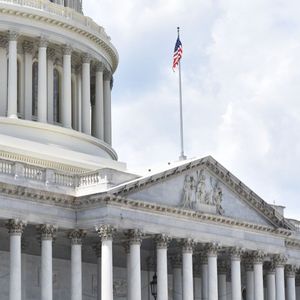US Congress Faces Deepening Rift Over Crypto Legislation
2 min read
The political divide in the US Congress over digital assets is growing sharper as top Democrats push back against Republican efforts to advance three crypto-related bills this week. House Financial Services Committee ranking member Maxine Waters and digital assets subcommittee ranking member Stephen Lynch announced on Friday that they would lead Democrats in opposing what they called “dangerous” legislation proposed by Republicans. Earlier, Republican leaders indicated plans to address bills on payment stablecoins, digital asset market structure, and central bank digital currencies (CBDCs) starting Monday. “Republicans are doubling down by fast-tracking a dangerous package of crypto legislation through Congress,” Waters said, warning that the proposed bills lacked critical consumer protections and national security safeguards while accusing the bills of enabling what she termed as “Trump’s unprecedented crypto scam.” The Republicans hold only a slim majority in the House, and it remains uncertain if they can gather enough support to pass all three bills given strong Democratic opposition. Trump Ties and Stablecoin Scrutiny Intensify Tensions Among the contested bills is the GENIUS Act, which passed the Senate despite initial Democratic pushback. However, debates around crypto legislation continue to draw connections to President Donald Trump’s crypto ventures, including his family-backed business World Liberty Financial, which reportedly added around $620 million to Trump’s portfolio within months. World Liberty Financial has attracted scrutiny for issuing its own stablecoin, USD1, as lawmakers consider regulations for the stablecoin market. Lynch criticized Republicans for “doing the bidding for the digital asset industry while conveniently ignoring the vulnerabilities and opportunities for abuse that exist in crypto.” In addition to the GENIUS Act, Republicans plan to advance the Anti-CBDC Surveillance State Act , aiming to block the development of a US government-issued digital dollar, and the CLARITY Act, intended to establish a structured regulatory framework for digital assets. Focus Shifts to Senate for Crypto Market Structure Bill White House digital asset adviser Bo Hines shared optimism on X, stating the GENIUS Act would pass the House without amendments, moving swiftly to the president’s desk. However, the push to pass a comprehensive crypto market structure bill is now shifting towards the Senate. Senate Banking Committee Chair Tim Scott, alongside Senators Cynthia Lummis and Kirsten Gillibrand, indicated plans to draft and introduce a crypto market structure bill by September 30, following the House’s “crypto week” plans for the CLARITY Act. House Financial Services Committee Chair French Hill confirmed the House would vote on the draft, after which the Senate would refine it further. The proposed bill is expected to clarify the regulatory roles of the Securities and Exchange Commission (SEC) and the Commodity Futures Trading Commission (CFTC) in overseeing digital assets, with suggestions leaning towards granting the CFTC greater authority for registering and regulating digital assets in the US. The post US Congress Faces Deepening Rift Over Crypto Legislation appeared first on TheCoinrise.com .

Source: The Coin Rise



